#if youre writing a fantasy story ADD FOOD RESTRICTIONS INTO IT ITS SO FUN I PROMMYYYYYY IT MAKES EVERYTHING SO INTERESTING
Explore tagged Tumblr posts
Text
margo has done a lot of interesting contradictory stuff but in my mind her most intriguing moment is when desta is musing on the ethics of raising meat rabbits (normal conversation to have) and margo is like "idk if its ethical and that's why i mostly stick to fish -_-" ethically dubious in her mind to eat meat but she'll happily kill a guy with zero hesitation. or a horse (as long as you don't eat the horse afterwards because THAT would be weird and ethically dubious). anyway more fantasy novels should have characters with food preferences. the depth you can add just based on what they refuse to eat is so vast.
#my favorite enigma. girl your morals and ethical compass are so wack.#her society doesnt have any hangups about eating meat she just has her own personal hangups which makes it so interesting that she does#if youre writing a fantasy story ADD FOOD RESTRICTIONS INTO IT ITS SO FUN I PROMMYYYYYY IT MAKES EVERYTHING SO INTERESTING#a day in the life of steeve#margo
2 notes
·
View notes
Photo
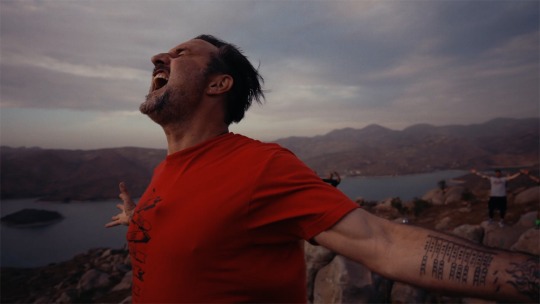
Fantasia 2020.
We emerge from the depths of Fantasia Festival 2020—the largest genre fest in North America—with the ten best things we saw this year.
Fantasia Festival aced this weird shitstorm of a year with one of the best online film festival experiences of 2020 so far. Sure, we miss that unique, zombie-like, end-of-fest haze brought on by midnight madness and inappropriate mealtimes, but quarantine breeds an adjacent kind of mental fog that made Fantasia’s online offering a weirdly natural place to be this year.
Tuning into Montreal from London and Auckland, our Fantasia team (Kambole Campbell, Aaron Yap and Gemma Gracewood) watched as widely as possible, and we recommend most of what we saw—but these are the ten films that stuck out.

Chasing Dream Directed by Johnnie To, written by Wai Ka-Fai, Ryder Chan and Mak Tin-Shu
Hong Kong master of genre Johnnie To once again links up with screenwriter Wai Ka Fai, the writer of Drug War and Romancing in Thin Air. Their new feature Chasing Dream finds itself somewhere between those two, telling the story of an MMA fighter with gang ties named Tiger (Jacky Heung, winner of Fantasia’s Best Actor award) who falls in love with an aspiring singer named Cuckoo (Keru Wang).
To and Wai Ka Fai’s incredibly goofy sense of humor is still totally intact, as they make a complete farce out of the singing competition that Cuckoo enters, with her greatest competitor continually performing so hard that she accumulates injuries, until she ends up in a full-body cast. As Michelle writes: “It’s Rocky meets A Star is Born, with a dash of American Idol, a pinch of musical, and a huge dollop of romance.” This is all to say that Chasing Dream really is a hell of a lot of movie at once. (KC)
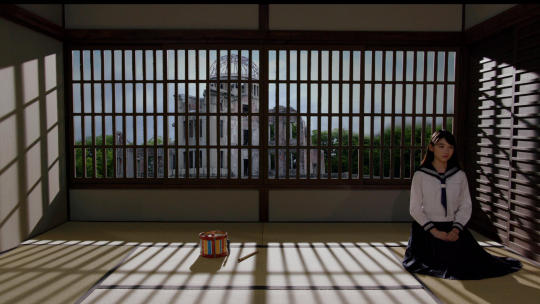
Labyrinth of Cinema Directed by Nobuhiko Ōbayashi, written by Kazuya Konaka, Nobu Obayashi and Tadashi Naitō
“It’s time to revisit our history to build a better future.” So begins Labyrinth of Cinema, the final film of Japanese experimental legend Nobuhiko Ōbayashi. Following a trilogy of films contemplating modern Japanese history and war (including the ravishing Hanagatami), Labyrinth is a metatextual and metaphysical trip through the history of Japanese cinema and its intersection with war.
A handful of young characters are quite literally absorbed into the screen of the cinema they’re sitting in at the film’s beginning, jumping through different eras and genres of film, tackling everything from war and propaganda, romance and musical, to chanbara and back again. Jake Cole notes the film’s surprising optimism, writing “even as Ōbayashi grows more sober, the film conveys more and more his strength of belief that cinema is still a force for good, and that if the past cannot be helped, perhaps movies can be rethought and re-crafted to produce a better future”. (KC)

Lapsis Written and directed by Noah Hutton
Noah Hutton (son of Timothy Hutton and Debra Winger) makes his narrative feature debut with a sci-fi-that’s-barely-sci-fi film, which dives into robotics, capitalism and unionization. Not a million miles away from the activist documentaries the director already has under his belt, Lapsis is a low-key, mordant film that captures gig-economy drudgery and the arcane fog of big tech. “Honestly really fucking cool,” writes David, of Hutton’s world-building on a shoestring. “An intelligent and peculiar concept expertly executed and thoroughly entertaining from beginning to end.” Dean Imperial’s surliness is a treat. (AY)
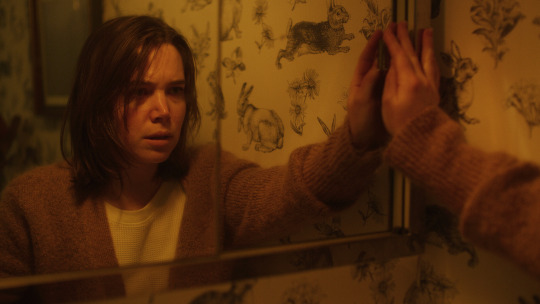
Bleed with Me Written and directed by Amelia Moses
Not one of Bleed with Me’s 79 minutes is wasted. If any of the following sound good to you—micro-thrillers, Robert Altman's Images, Rodney Ascher’s The Nightmare, mumblecore Bergman—add Amelia Moses’ debut feature to your watchlist now. It’s an assured start from Moses, who crafts an unsettling, tantalizingly ambiguous atmosphere from the three-hander, cabin-in-the-snow confines, with Scrabble, gaslighting, bloodletting and sleep paralysis thrown in.
“Lee Marshall anchors the film with a deeply moving performance as Rowan,” writes Finhorror. “With every facial expression, movement, and line reading, she sells vulnerability and discomfort while showing a minimal amount of effort.” Would pair well with Mickey Reece’s Climate of the Hunter (florid dinner conversations, immaculate food-porn and psycho-sexual tension) for an ace double feature. (AY)

PVT CHAT Written and directed by Ben Hozie
New York filmmaker Ben Hozie examines online relationships and modern sexual fantasies with PVT CHAT, starring Uncut Gems breakout star Julia Fox as Scarlet, a cam-girl dominatrix. The film splits its focus between Scarlet and Jack (played by Peter Vack), an internet gambler who mostly remains inside his NYC apartment as he becomes fixated on her. While there’s palpable discomfort in Jack’s increasing obsession with Scarlet, the film doesn’t mock the practitioner nor the customer, and it doesn’t moralize over either of their actions—it simply leaves them plain to witness, as though a normal element of contemporary digital living.
The genuineness of the relationship between Scarlet and Jack is ambiguous—the line between performance and sincere emotion distorted via pixels. As they continue to open up to each other the line blurs further, and PVT CHAT becomes a fascinating observation of how online communication has changed and commodified the ways in which we interact with each other. (KC)
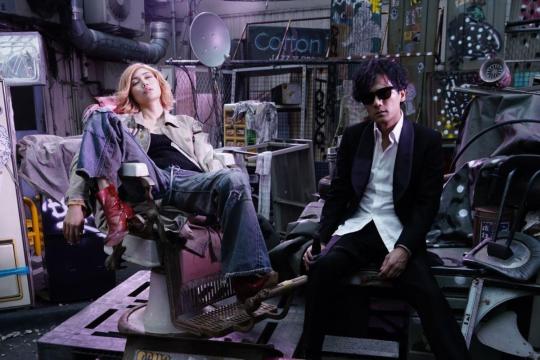
Tezuka’s Barbara Directed by Makoto Tezuka, screenplay by Hisako Kurasawa
Speaking of obsessions, Japanese filmmaker Makoto Tezuka might have chosen his father’s strangest work to adapt into a live-action film. As it says in the title, Tezuka’s Barbara is an adaptation of ‘godfather of manga’ Osamu Tezuka’s Barbara, his most hallucinatory and sexually explicit work. Opening with a Nietzsche quote about madness and love, Tezuka’s Barbara more or less conflates the two, as the main character Yosuke, an author who specializes in lurid and trashy paperbacks, falls obsessively in love with Barbara, a homeless drifter he meets in the street.
Beautifully lensed by Christopher Doyle, legendary cinematographer of Chungking Express and In The Mood For Love, Tezuka’s Barbara takes on a magical and ethereal quality, particularly in its sex scenes. Yosuke’s increasingly deranged obsession with Barbara and the young Tezuka’s depiction of it is compellingly weird, from its vivid colors and almost antiquated costuming to its Eyes Wide Shut-esque rituals of the wealthy. Deranged, perhaps opaque, but a riveting visual journey, especially with its context in mind. (KC)
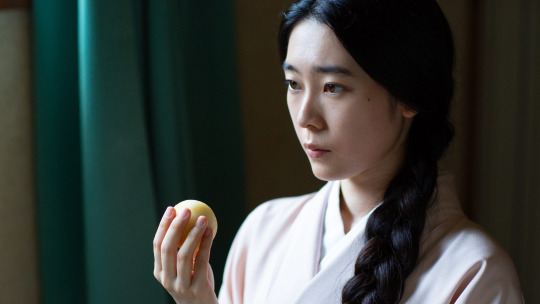
Special Actors Written and directed by Shinichiro Ueda
Special Actors is the new film from Shinichiro Ueda, who turned heads with his bonkers cult film One Cut of the Dead. It may appear a little less surprising to those already familiar with his tactics, but it’s no less entertaining for it. Special Actors starts one way, as the tale of an aspiring actor looking for work, and ends somewhere else entirely. Brought into a company named ‘Special Actors’ by his estranged younger brother, Kazuko embarks on a different kind of performer’s journey, not just restricted to film and commercials, but also playing implanted mourners at funerals, fake boyfriends—whatever the client desires.
This is an Ueda film, so of course it takes a huge swerve, transforming into a bizarre and entertaining caper as the Special Actors are hired to infiltrate a cult. Ueda is more than aware of the classic conflation of film with “fakery” (as Orson Welles would call it)—the structure of a caper and its layers of illusion, truth and everything in between aligning with the requirements of stagecraft—and he has more than a little fun with it. As a result, so do we. (KC)

Feels Good Man Directed by Arthur Jones / Available on demand now
The internet was a mistake. Even if you try to stay out of the digital trash-fires, you’ll likely have heard of the ‘Pepe the Frog’ meme. Turns out, we need to pay attention to these things, particularly with another US election looming. In Feels Good Man, Arthur Jones introduces us to Matt Furie, the humble cartoonist behind the original Pepe, and then takes several wild and weird side-roads, with the most unexpected-but-entertaining talking heads, as we learn just how 4Chan and the alt-right adopted, weaponized and took the frog all the way to the White House, earning official hate-symbol status. “I came in expecting a solid documentary about a meme, and I ended up getting that and a compelling narrative about today’s troubling world,” writes Zach. (GG)
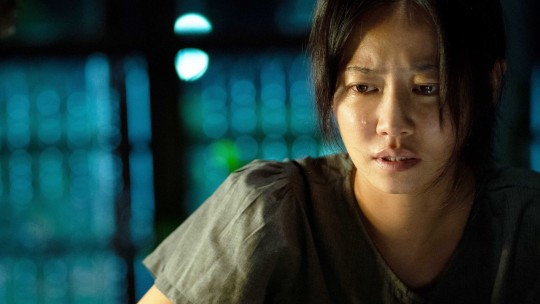
Sheep Without a Shepherd Directed by Sam Quah, written by Yang Weiwei
Dare we say “Letterboxd meets Parasite”? Sheep Without a Shepherd, Sam Quah’s debut feature (based on Jeethu Joseph’s highly rated film Drishyam), is a cinephiliac feast about have-nots taking on upper-echelon corruption. Lead character Weijie (Xiao Yang) is a working-class, obsessive cinephile who vomits his movie knowledge any chance he can get. When his family is pulled into a case of police corruption, this same cinephilia may be the only thing that gets them out of it. It’s a sturdily wrought Hitchcockian homage, with a well-calibrated balance of suspense, humor and pathos.
“What a gut punch of a movie in the best way,” writes Amanda. “A little messy at times, especially in the end, and some questionable forensics, but this is something I’ll definitely be revisiting.” The jury is still out on whether the ending—make that the many endings—worked, but for the most part Letterboxd members enjoyed the cat-and-mouseness of it all, along with its moral questionability. (AY)

You Cannot Kill David Arquette Directed by David Darg and Price James / Available on demand now
You Cannot Kill David Arquette is a rousing, eye-opening and mostly upbeat gawk at the life of the Hollywood star whose fortunes have lately run dry. Although he is out of shape and has very young children (and very cute Basset hounds) to think of, Arquette is desperate to reignite his love of pro wrestling. In a quest to prove to his heroes that he’s serious about the sport, the actor participates in backyard wrestling matches in Virginia, joins street-fighters in Mexico, and goes down a K-hole at the hands of health professionals.
“Arquette is searching for a shred of legitimacy in a world that’s always made him feel like a fraud, and by the end of this loveable, hilarious, and ineffably heartfelt doc it’s almost impossible not to believe in him,” writes David Ehrlich. As compelling a look at mental health as physical, the film benefits from the inclusion of conversations with those closest to Arquette (both of his wives feature), and there’s a heart-skipping scene involving the late Luke Perry. (GG)
Lastly, our team wanted to shout out to Daria Woszek’s Marygoround for the best end credits dedication of the year. Thanks, Fantasia! Roll on 2021.

#fantasia#fantasia festival#midnight madness#fantasia fest#film festival#genre festival#montreal#letterboxd
1 note
·
View note